|
|
|
Sort Order |
|
|
|
Items / Page
|
|
|
|
|
|
|
| Srl | Item |
| 1 |
ID:
100797
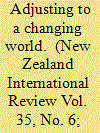

|
|
|
| 2 |
ID:
159465
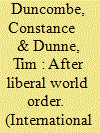

|
|
|
|
|
| Summary/Abstract |
In recent years claims about the end times of the liberal world order have gathered force, with the talk of order giving way to disruption. While there are different accounts of these disruptive dynamics and their causes, it is nevertheless a rare moment in International Relations when all mainstream theories concur that the hegemony of the liberal world order is over and that there is considerable uncertainty about the global architecture that will take its place. Yet claiming that the liberal world order is in trouble is just a starting-point—a deeper account is needed to show how each interrelated element ‘hangs together’. We examine two interrelated patterns to liberal world ordering—internationalism and imperialism. After unpacking each of these interrelated ideas which constitute liberal world order, the narrative will focus on the politics and practice of humanitarianism. Humanitarianism is, of course, deeply intertwined with liberal assumptions about an ethic of care for peoples who are either at risk of, or worse still suffering from, large-scale natural disasters and politically-induced atrocities. Our inference is that the condition of humanitarianism provides a good indication of the state of the liberal world order—its limits and possibilities.
|
|
|
|
|
|
|
|
|
|
|
|
|
|
|
|
| 3 |
ID:
165050
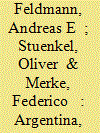

|
|
|
|
|
| Summary/Abstract |
This article examines the role of Argentina, Brazil and Chile (the ‘ABC countries’) in supporting democracy through the logic of consequences and appropriateness in three emblematic cases: the removal of President Zelaya in Honduras in 2009, the constitutional crisis that led to the removal of President Fernando Lugo in Paraguay 2012 and the sudden closing of the National Assembly in Venezuela in 2017. The authors argue that the ABC governments’ responses to governance crises have been shaped by a mixture of motivations, both instrumental (geopolitical interest or ideological affinity) and ideational (a normative preference for democracy). This mixture has resulted in inconsistent policies deriving from the mismatch between the normative commitments made by these countries, enshrined in multilateral instruments such as democracy clauses, which have often limited their room for manoeuvre, and their preference for a measured, prudent foreign policy based upon traditional principles of non-intervention. Specifically, the authors find that the ABC countries’ stance on democracy support depends on two fundamental conditions: their leverage vis-à-vis the target state and the degree of certainty regarding a potential resolution of a given democratic crisis.
|
|
|
|
|
|
|
|
|
|
|
|
|
|
|
|
| 4 |
ID:
108115
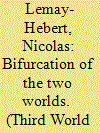

|
|
|
|
|
| Publication |
2011.
|
| Summary/Abstract |
Studies increasingly highlight the limits of state building conducted 'from the top-down'. Building on the literature and using a Rosenauian concept in a novel way, this article posits that international interventions create a 'bifurcation of the two worlds'. Departing from a study of Kosovo and Timor-Leste, the article posits that the massive arrival of staff involved in international governance will create a social gap between the international and the local 'worlds', which will in turn become a target of narratives of resistance by local actors. This bifurcation is exemplified by the 'white car syndrome', a concept representing the horde of white UN vehicles accompanying major interventions and developed in this contribution. Thus, the article attempts to shed new light on the legitimacy crises that Kosovo and Timor-Leste experienced at the beginning of the current century, while demonstrating and increasing the linkages between development studies and peace studies.
|
|
|
|
|
|
|
|
|
|
|
|
|
|
|
|
| 5 |
ID:
093668
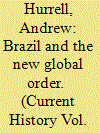

|
|
|
|
|
| Publication |
2010.
|
| Summary/Abstract |
Brazilian foreign policy under Lula has emphasized not only traditional multilateralism but also membership in the new formal and informal groupings that have emerged at the heart of a new world order.
|
|
|
|
|
|
|
|
|
|
|
|
|
|
|
|
| 6 |
ID:
170399
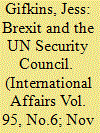

|
|
|
|
|
| Summary/Abstract |
The United Kingdom's decision to leave the European Union has ramifications beyond the UK and the EU. This article analyses the impact of the Brexit referendum on the UK's political capital in the United Nations Security Council; a dimension of Brexit that has received little attention thus far. Drawing on extensive elite interviews we show that the UK has considerable political capital in the Council, where it is seen as one of the most effective actors, but the reputational costs of Brexit are tarnishing this image. With case-studies on the UK's role in Somalia and Yemen we show how the UK has been able to further its interests with dual roles in the EU and Security Council, and the risks posed by tensions between trade and human rights after Brexit. We also analyse what it takes to be influential within the Security Council and argue that more attention should be paid to the practices of diplomacy. Influence is gained via penholding, strong diplomatic skill and a well-regarded UN permanent representative. The UK accrues political capital as a leader on the humanitarian and human rights side of the Council's agenda, but this reputation is at risk as it exits the EU.
|
|
|
|
|
|
|
|
|
|
|
|
|
|
|
|
| 7 |
ID:
157973
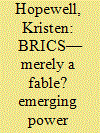

|
|
|
|
|
| Summary/Abstract |
The much hyped rise of the BRICS (Brazil, Russia, India, China and South Africa) has lately been met with equally fervent declarations of their demise. Amid slowing growth in many of these countries, the prevailing view now appears to be that the rise of the BRICS was little more than an illusion. In this article, however, I contest this assessment by arguing that the emerging powers were never solely, nor most importantly, merely an economic phenomenon. Instead, I show that emerging powers—specifically Brazil, India and China—have become an important political force in the global trading system and have had a profound and lasting impact on the World Trade Organization (WTO). Contrary to the widespread assumption that these countries are too diverse to ally, I argue that the emerging powers displayed a remarkable degree of unity and cooperation, working in close concert to successfully challenge the dominance of the US and other established powers. As evidenced by the collapse of the Doha Round, the collective rise of Brazil, India and China substantially disrupted the functioning of one of the core institutions of the liberal economic order created under US hegemony.
|
|
|
|
|
|
|
|
|
|
|
|
|
|
|
|
| 8 |
ID:
087486
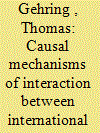

|
|
|
|
|
| Publication |
2009.
|
| Summary/Abstract |
This article develops a conceptual framework for the systematic analysis of the interaction between international institutions as a first step towards building a theory of international interaction. It examines how international institutions may exert causal influence on each other's development and effectiveness and suggests that four general causal mechanisms can elucidate the distinct routes through which influence travels from one institution to another. Institutional interaction can thus rely on transfer of knowledge, commitments established under an institution, behavioural effects of an institution, and functional linkage of the ultimate governance targets of the institutions involved. The article also puts forward hypotheses about the likely effects of specific types of institutional interaction for governance within the international system. The causal mechanisms and types of interaction are mutually exclusive models that help analyse real-world interaction situations. They may also serve as a basis for the systematic analysis of more complex interaction situations.
|
|
|
|
|
|
|
|
|
|
|
|
|
|
|
|
| 9 |
ID:
087494
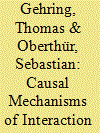

|
|
|
|
|
| Publication |
2009.
|
| Summary/Abstract |
This article develops a conceptual framework for the systematic analysis of the interaction between international institutions as a first step towards building a theory of international interaction. It examines how international institutions may exert causal influence on each other's development and effectiveness and suggests that four general causal mechanisms can elucidate the distinct routes through which influence travels from one institution to another. Institutional interaction can thus rely on transfer of knowledge, commitments established under an institution, behavioural effects of an institution, and functional linkage of the ultimate governance targets of the institutions involved. The article also puts forward hypotheses about the likely effects of specific types of institutional interaction for governance within the international system. The causal mechanisms and types of interaction are mutually exclusive models that help analyse real-world interaction situations. They may also serve as a basis for the systematic analysis of more complex interaction situations.
|
|
|
|
|
|
|
|
|
|
|
|
|
|
|
|
| 10 |
ID:
151866
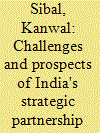

|
|
|
| 11 |
ID:
167108
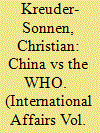

|
|
|
|
|
| Summary/Abstract |
This article studies a conflict over two competing norms in which the actors demonstrated incompatible positions not through arguments, but through actions. During the SARS crisis, China and the World Health Organization (WHO) entered a norm conflict over the precedence of sovereignty or global health security. Both resorted to behavioural, not discursive contestation: while the WHO practically but not rhetorically challenged the sovereignty norm by acting according to the norm of global health security, China—without openly acknowledging it—contravened the basic principles of global health security by acting according to the overlapping sovereignty norm. Why and with what consequences do actors choose to contest norms through actions rather than words? The article accounts for the resort to behavioural contestation by pointing to the strategic advantages it offers for furthering a contentious norm understanding without facing the social costs of making it explicit. It furthermore highlights that behavioural contestation may feed back into and change the odds of discursive contestation as its practical effects provide rhetorical resources to (de-)legitimate one or the other position. The propositions are illustrated in the interactions of China and the WHO during the SARS crisis and the subsequent norm development. This article forms part of the special section of the May 2019 issue of International Affairs on ‘The dynamics of dissent’, guest-edited by Anette Stimmer and Lea Wisken.
|
|
|
|
|
|
|
|
|
|
|
|
|
|
|
|
| 12 |
ID:
170401
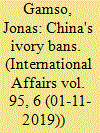

|
|
|
|
|
| Summary/Abstract |
China has been a major market for elephant ivory for centuries. However, the Chinese government recently enacted bans on imports and exports of ivory (2015) and on the domestic ivory trade (2017). These bans appear to have come in response to intensive influence campaigns and public shaming from domestic and foreign activists, who cited declining elephant populations and highlighted China's role. However, this shaming-narrative is at odds with conventional wisdom regarding Chinese policy-making: China typically resists international pressures and its authoritarian government is thought to be largely insulated from domestic efforts by civil society groups. This article reconciles Beijing's ivory policy with these conventional beliefs about policy-making in China. I argue that the Chinese government saw unique benefits to banning the ivory trade, under growing international scrutiny, as doing so enhanced Chinese soft power while having very little impact on its sovereignty or development. Non-government organizations (NGOs) operating both inside and outside of China played a role as well: NGOs in China helped to shift Chinese public opinion towards favouring the bans, while those operating abroad led public relations efforts to publicize Chinese demand for ivory to foreign audiences. Efforts by the latter group of NGOs intensified pressure on the Chinese government to rein in the ivory market, while increasing the soft power benefits that banning ivory would bring to Beijing.
|
|
|
|
|
|
|
|
|
|
|
|
|
|
|
|
| 13 |
ID:
167112


|
|
|
|
|
| Summary/Abstract |
The Protection of Civilians (PoC) in peacekeeping and the Responsibility to Protect (R2P) populations from atrocity crimes are two norms that emerged at the turn of the new millennium with the aim of protecting vulnerable peoples from mass violence and/or systematic and widespread violations of human rights. To date, most scholars have analysed the discourses over the status, strength and robustness of both norms separately. And yet, the distinction between the two has at times been exceptionally fine. In this article, we analyse the constitutive relationship between PoC and R2P, and the impact of discursive and behavioural contestation on their joint evolution within the UN system and state practice over three phases (1999–2005; 2006–10; 2011–18). In so doing, we contribute to the International Relations literature on norms by illuminating ideational interplay in the dynamics of norm evolution and contestation. More specifically, we illustrate how actors may seek to strengthen support for one norm, or dimension of a norm, by contrasting it or linking it with another. Our analysis also reveals that while the two norms of R2P and PoC were initially debated and implemented through different institutional paths and policy frameworks, discursive and behavioural contestation has in more recent years brought them closer together in one important respect. The meaning ascribed to both norms—by representatives of states and institutions such as the United Nations—has become more state-centric, with an emphasis on building and strengthening the capacity of national authorities to protect populations. This meaning contrasts with the more cosmopolitan origins of R2P and PoC, and arguably limits possibilities for the external enforcement of both norms through any form of international authority that stands above or outside sovereign states. This article forms part of the special section of the May 2019 issue of International Affairs on ‘The dynamics of dissent’, guest-edited by Anette Stimmer and Lea Wisken.
|
|
|
|
|
|
|
|
|
|
|
|
|
|
|
|
| 14 |
ID:
158714
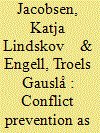

|
|
|
|
|
| Summary/Abstract |
Contemporary conflict prevention depends on information gathering and knowledge production about developments within the borders of a state, whose internal affairs have been deemed precarious by external actors. The international community, especially the United Nations (UN), calls this early warning and early action. However, for governments whose affairs are considered in need of monitoring, preventive endeavours—and the knowledge production they entail—can be seen as ‘early aggression’. In this article, we argue that seeing knowledge production as having power effects reveals contemporary conflict prevention as an interventionary practice. Through an analysis of the international community's preventive diplomacy vis-à-vis Burundi (2015–2016) we highlight three unintended power effects: privileging the UN's knowledge production created resistance to international involvement from the Government of Burundi, it led to a change in patterns of violence and to a backlash against the institutionalization of international monitoring beyond Burundi, and it enabled arguments for further, more forceful, intervention possibilities. This framing enables us to understand the recent return to conflict prevention not as a retreat from liberal interventionism, but as a pragmatic response to its purported crisis. Crucially, although conflict prevention falls short of military intervention, it nonetheless leaves important interventionist footprints.
|
|
|
|
|
|
|
|
|
|
|
|
|
|
|
|
| 15 |
ID:
157532
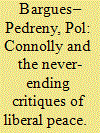

|
|
|
|
|
| Summary/Abstract |
Over the last decade, a dominant critique of international interventions underlines the problem that interventionary strategies have denied the political, societal and cultural heterogeneity of conflict-affected societies, excluding the interests of the majority of their population. A deeper engagement with the everyday life of these societies is understood to expose the errors of international missions and animate an alternative way of thinking about peace: ‘hybrid peace’, which is formed contextually and from below. Engaging with William Connolly’s work on pluralism, this article clarifies the nature of this critique, which rests securely on the assumption that local alterity cannot be fully understood, respected or treated sensitively by international governance approaches. However, as much as this assumption enables the thinking of an emancipatory hybrid peace, it is in turn the source of its critique, as hybrid peace is also seen as reproducing binary schemas and thus considered incapable of caring for the societies intervened in. At the conclusion, the metaphor of vorarephilia—paraphilia where sexual arousal occurs in the idea of being eaten or eating another person—will be used to warn against the tragic direction that critiques seem to be travelling to: critical scholars would be increasingly tempted to welcome the inevitable failures of international interventions.
|
|
|
|
|
|
|
|
|
|
|
|
|
|
|
|
| 16 |
ID:
080902
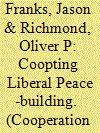

|
|
|
|
|
| Publication |
2008.
|
| Summary/Abstract |
The liberal peace framework aims to regulate, govern and empower the individual in a democratic and pluralist milieu. Yet liberal peace-building, even on the scale and depth employed in the international governance of Kosovo, is susceptible to local cooption, particularly where one group can adopt the language of the liberal peace and has strong support and credibility from the international community. This has led to a focus on achieving statehood for Kosovan Albanians, the marginalization of other identity groups and their agendas, and consequently the undermining of the pluralist goals of peace-building with the implicit cooperation of liberal peace-builders. Given Serb opposition to statehood for Kosovo, there is a danger that liberal peace-building will encourage the partition of Kosovo rather than create a pluralist polity. The article illustrates the susceptibility of liberal peace-building to local cooption
|
|
|
|
|
|
|
|
|
|
|
|
|
|
|
|
| 17 |
ID:
155477
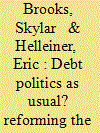

|
|
|
|
|
| Summary/Abstract |
In the wake of the 2008 financial crisis and costly debt restructurings in Greece and Argentina, the sovereign debt restructuring regime (SDRR) has been reformed in a number of ways. Taken together, these reforms have had a mixed impact in comparison to existing governance arrangements put in place during the early 2000s: changes to IMF lending rules have weakened the regime, reforms to sovereign bond contracts have strengthened it, and a UN-centred initiative to construct a new multilateral debt restructuring framework has had little impact in either direction. The pattern of post-2008 change reveals that reforms focusing on pre-defined rules to trigger debt restructuring (the IMF lending reforms) are less likely to succeed than those focused on the process of restructuring once the decision to restructure has been taken (contract reforms). It also shows that efforts to build comprehensive, multilateral legal frameworks for debt restructuring (the initial goal of the UN initiative) face enormous obstacles. At a more theoretical level, the post-2008 experience highlights the enduring power of the United States and leading European states to shape outcomes in this sector, as well as the need to embrace eclectic theoretical frameworks in analysing the complicated politics of SDRR reform.
|
|
|
|
|
|
|
|
|
|
|
|
|
|
|
|
| 18 |
ID:
166754
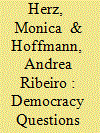

|
|
|
|
|
| Summary/Abstract |
Practices of informal governance have become more frequent in the last decades, and several scholars have highlighted its positive effects to address the shortcomings of global governance. We discuss this trend from the perspective of the debate of democratic theory regarding the concentration of power. We explore mechanisms that evolved to deal with the concentration of power at the level of modern nation-states: the separation of powers, citizen vigilance, and deliberation. These ideas are treated as challenges for informal global governance. We call for an innovative dialogue between democratic theory and the literature on informal international governance, moving the discussion beyond the debate on the democratic deficit at the global level.
|
|
|
|
|
|
|
|
|
|
|
|
|
|
|
|
| 19 |
ID:
113517
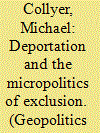

|
|
|
|
|
| Publication |
2012.
|
| Summary/Abstract |
The forced removal of foreign nationals has been a relatively uncommon occurrence in liberal democracies, at least since the 2nd World War. This can be explained by both the inherent violence of this process, which raises widespread public opposition, and by the geopolitical difficulties it raises, as there must be agreement of both countries concerned. In recent years these problems appear to have been partially overcome and since 2005 a 'deportation turn' is evident across the European Union as deportations increase. This paper focuses on the international dimension to this increase, following work investigating deportation as an essentially biopolitical process of international governance of populations. This approach is developed in an analysis of the geopolitical impacts of that management process. The paper uses empirical research with Sri Lankan migrants who left the UK either as a result of force or voluntary returns policies to explain this development. It identifies the changing strategy of the deportation process, particularly recent attention to the negotiation of bilateral and multilateral readmission agreements and the role of international organisations as mediators as key contributions to an explanation for the rise in deportations.
|
|
|
|
|
|
|
|
|
|
|
|
|
|
|
|
| 20 |
ID:
141512
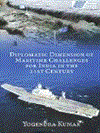

|
|
|
|
|
| Publication |
New Delhi, Pentagon Press, 2015.
|
| Description |
xii, 258p.hbk
|
| Standard Number |
9788182748538
|
|
|
|
|
|
|
|
|
|
|
|
Copies: C:1/I:0,R:0,Q:0
Circulation
| Accession# | Call# | Current Location | Status | Policy | Location |
| 058347 | 359.03054/KUM 058347 | Main | On Shelf | General | |
|
|
|
|
|
|
|
|
|